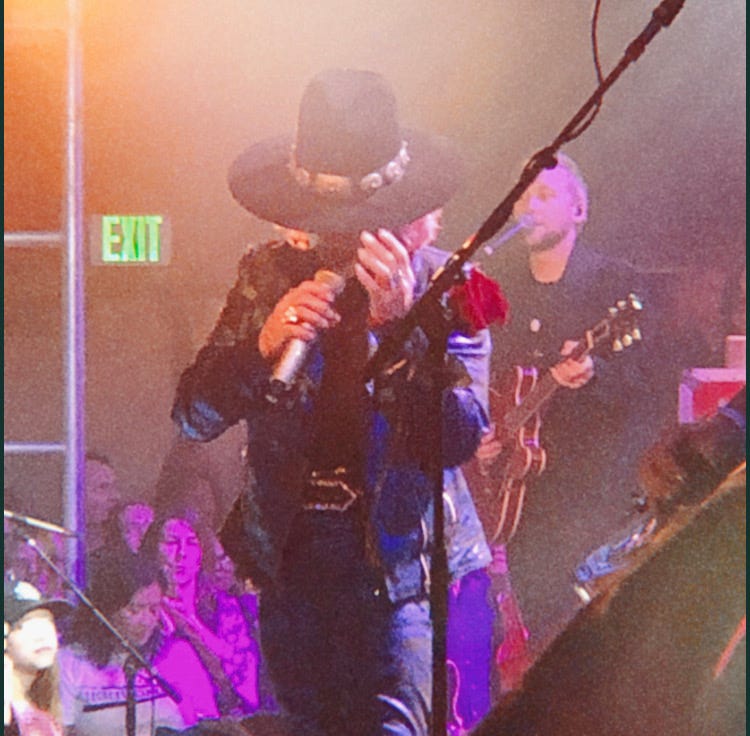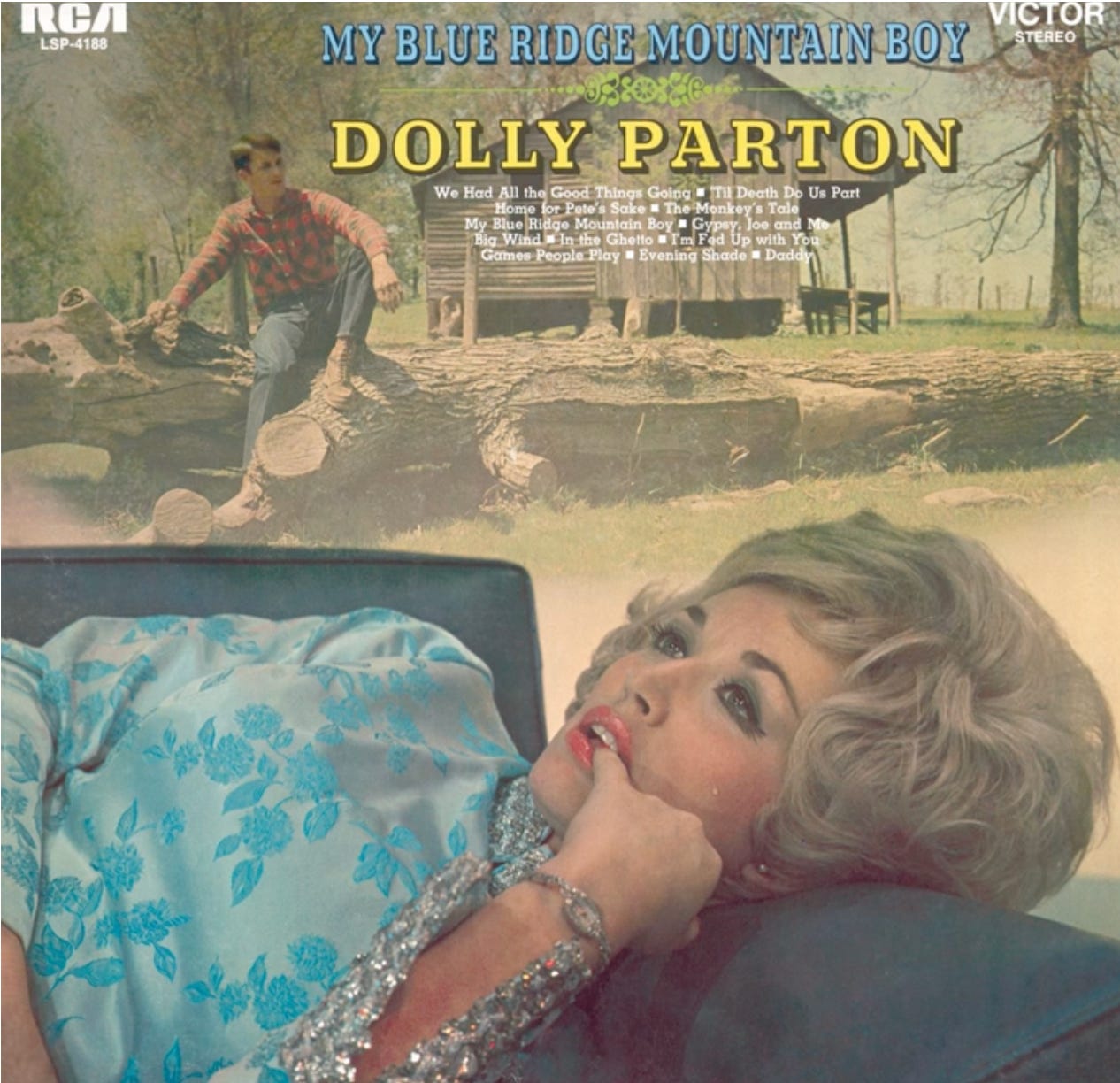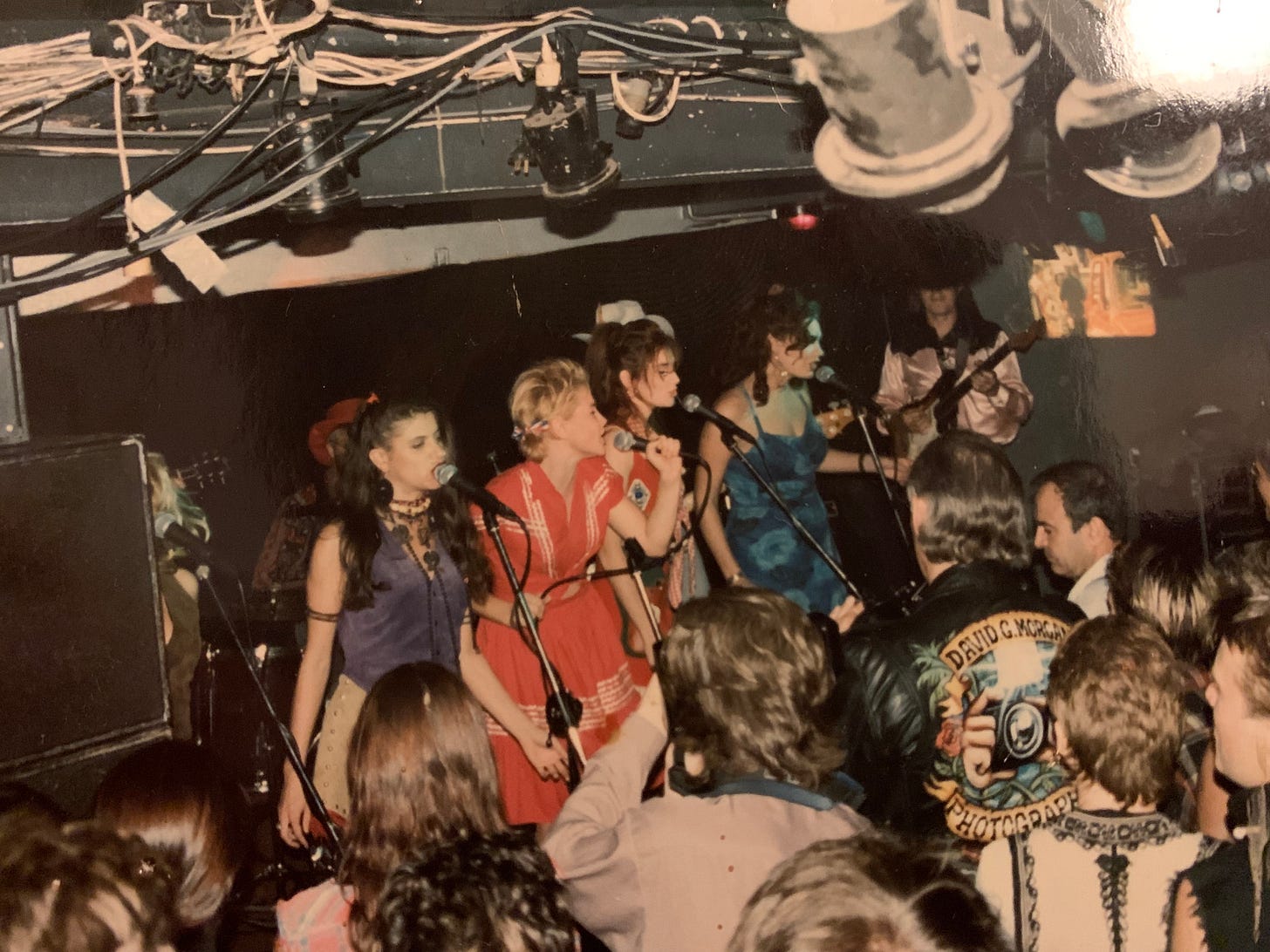Crazy Mama
On Mad, Bad & Dangerous Women In Country Music
‘Delta Dawn’ has to be one of the strangest hit songs in country music ever. The story of a ‘crazy’ child/woman lost inside a romantic dream that’s never going to come true, made famous by a preternaturally worldly-wise thirteen year old Tanya Tucker - who somehow sounds exactly the same singing here on Hee Haw as she does singing it now - the cinematic song possesses a kind of power to give the listener goosebumps over and over again. Tanya told CMT that when producer Billy Sherrill played it to her in his studio, where they were auditioning songs for her recording debut, she immediately said, ‘That’s my song!’.
She was 41 and her Daddy still calls her baby/All the folks round Brownsville say she’s crazy/Cos she walks downtown with a suitcase in her hand/Looking for a mysterious dark haired man
Sherrill suggested she record the chorus a cappella to open the song, and despite not knowing what the term meant she loved the idea. Tanya sung live, along with the musicians, not even wearing headphones, and the raw unvarnished gold of the result was so blindingly obvious it was rush released four days later.
Side note, is it wrong to covet this dress baby Mother Tucker is wearing? I really love it.
Tanya was close to thirty years younger than the protagonist when she first sang it in 1972 and is now around thirty years older than her, but she claims she never gets tired of performing the song. I’ve been lucky enough to be in a Tanya Tucker crowd (The Troubadour in LA, 2019, unbelievably great show!) and a kind of breathless hush befalls the room when she’s about to sing it; everyone is just transported by this moving tale of a woman who can’t give up on the lie of the mansion in the sky she was promised, sung by this badass icon. When Tanya points the microphone into the audience the rapturous singalong that explodes is astonishing. In 1988 she said ‘I thank the lucky stars and the good Lord for that song. If it hadn’t been for [‘Delta Dawn’], I probably would’ve been a rodeo queen or something.’
Songwriter Alex Harvey was inspired to write ‘Delta Dawn’ when he was visited by the ghost of his own mother, a ‘crazy lady’ he described as having ‘come from the Mississippi Delta and she always lived her life as if she had a suitcase in her hand but nowhere to put it down’. She took her own life, the day fifteen year old Alex had excitedly taped his first musical appearance on TV, that he refused to allow her to attend; ‘She drank and sometimes would do things that would make me feel ashamed, so I asked her not to go’.
Twenty years later, her laughing ghost appeared to tell him that to be free of the guilt and pain he had to embrace it, and understand it was hers, not his. He then proceeded to write the song in seven minutes. What a mother of a gift. It became a hit three times, crossing over to the pop charts with both Bette Midler (1971) and Helen Reddy (1973).
This brings us to Exhibit B in Crazy Ladies of Country Music, which was actually a hit for ol’ Jerry Lee Lewis in 1969, a few years before Delta Dawn appeared to the world like a fever dream.
The understanding lover left behind in ‘She Even Woke Me Up To Say Goodbye’ comes across as quite the noble guy, wishing his soon-to-be-ex well, despite the fact that “Lord I've seen the pity that's in their eyes/They could never understand it's her sorrow it's not a man/And no matter what they say we know she tried”.
Now don’t get me wrong, I really love this song, its aching melody, its devastating romantic melancholy, the painterly lyrics, the stiff upper lip of it - but something about the fact that our man is suggesting his lover must be mentally ill to be leaving him always struck me as a little, um, revisionist. And patronising.
Pair that with the fact that the always proudly narcissistic Jerry Lee was never known for his emotional maturity nor his kindliness towards the opposite sex, and it all comes across a little too passive aggressive DARVO (Denial/Atttack/Reverse Victim & Offender) for my liking.
Its not her heart Lord, its her mind
She didn’t mean to be unkind
She even woke me up to say goodbye
Jeannie C. Riley’s 1968 sassy monster hit ‘Harper Valley PTA’, that made her the first woman to reach number one on the Billboard Hot 100 and the U.S. Hot Country Singles charts and went on to spawn a movie, was also inspired by a mother, this time of one of songwriter Tom T Hall’s classmates.
As a kid he witnessed her giving the school board hell in response to being censured by them. He says this was absolutely unheard of at the time, the mid 1940s, and her impressive chutzpah always stayed with him. As a young single mother, the feisty fuck you righteousness of this song felt somewhat relatable to me.
Well, the note said, "Mrs. Johnson
You're wearin' your dresses way too high
It's reported you've been drinking
And a-running 'round with men and goin' wild
And we don't believe you oughta be a-bringin' up
Your little girl this way"
And it was signed by the Secretary
Harper Valley PTA
In Martina McBride’s powerful 1994 anthem ‘Independence Day’, a little girl narrates the story of her abused mother burning down the family home with the abuser inside.
Songwriter Gretchen Peters told The Boot in 2018 ‘It took 18 months to write it. As I lived with it, the story of the mother and daughter started to come, and I knew that obviously the ‘Independence Day’ thing was a metaphor for [the mother in the song] finding her freedom. How does a woman in that situation find freedom?
I was still a relatively young songwriter, and I really, really wanted to find a happy ending, or at least one that wasn't so dire and dismal. That's why it took me so long to write the song, because I kept trying to make things work out okay. At the end, I realized that it was kind of ironic that I was going through the same process that the mother in the song was going through, of trying to find a way out that didn't involve death and destruction. In the third verse, where the daughter says "I ain't saying it's right or it's wrong / But maybe it's the only way," that was my way of saying that, sometimes, this is what happens. I'm not telling you it should be what happens; I'm telling you what happened to this particular family’.
The heartbreaking comments beneath the official YouTube video make it entirely too clear why the song resonated so hard.
A star in the treasury of ‘dark Dolly Parton’ songs, ‘Evening Shade’ (1969) tells the story of a bunch of orphans deemed ‘juvenile delinquents’ by their evil caretakers who show them no mercy. The kids are finally driven crazy enough to take matters into their own hands and burn the joint down with the cruel matron inside. In Dolly’s 2020 book Songteller she explains 'Evening Shade was burning, just like the Hell it was. Now I'm not advocating violence of any kind. It's just a song. And I can get away with that in a song.’
Little Susan Bradley, one night had wet her bed
Mrs. Bailey took the razor strap and beat her half to death
And I knew that something must be done to put an end to this
And so I started talking plans with the older kids
Back when I first started songwriting, ‘Evening Shade’ inspired me to write a similar little number called ‘Date Rape’, never recorded and a little more on the black comedy side, about the ultimate justice meted out to the titular perpetrator.
Dolly’s heartbreaking 1968 album cut ‘If I Lose My Mind’ tells the story of a young woman who has returned home to stay with her mother so she can have a complete mental breakdown after the man she loved ‘tortured’ and ‘did things’ to her she ‘couldn’t understand’: ‘Why, he made me watch him love another woman, And he tried to make me love another man’. She begs her mother to ‘have them lock me up and see I get good care’ if she totally loses her marbles.
The saddest thing about this song is how traumatised Dolly sounds; there’s no anger at her uncaring swinger husband, no blame, just a sad resignation to her eternal fate as a damaged, crazy woman. The only hint of hope we have for her is in the final line ‘I was afraid of what I'd do if I stayed there’, where we see a spark of her suppressed outrage and how she was trying to resist doing something, possibly murder, she felt she would live to regret.
Lets compare and contrast this with the modern heroine of ‘Mama’s Broken Heart’, who is exploding with ferocious force.
The powerful lyrics by the unholy good songwriting trinity of Kacey Musgraves/Brandi Clark/Shane McAnally, detail a war of the Southern roses between our protagonist who is flipping out after being dumped and her mama who ‘came from a softer generation/Where you get a grip and bite your lip just to save a little face’ and is demanding she ‘Go and fix your makeup girl, it's just a breakup/Run and hide your crazy and start actin' like a lady/'Cause I raised you better, gotta keep it together/Even when you fall apart’. Suppression 101.
The song was intended for Kacey’s debut album, but Miranda Lambert heard the demo and begged Kacey to allow her to record it. The song drags female rage kicking and screaming into the open, unashamedly reclaiming the singer’s right to express herself with the kicker ‘But this ain't my mama's broken heart’.
I cut my bangs with some rusty kitchen scissors
I screamed his name 'til the neighbours called the cops
I numbed the pain at the expense of my liver
Don't know what I did next, all I know, I couldn't stop
The one hundred and seven million views the fabulous video has received seem to indicate Miranda was correct in guessing it would resonate.
Miranda has fully gone to bat for the country crazy ladies, wearing her crazy like a badge of honour - the characters in Miranda’s song aren’t ashamed of being messed up, broken, angry, vengeful, remorseful, disassociating, acting out, acting up, getting high, running wild, takin’ pills and tons of blackout drinking. There’s no victims here, only empowered women owning their full spectrums of actions and emotions, even when its taking them somewhere bad, sad or dangerous.
A quick roll call of Miranda’s wild ladies of song:
Vice - ‘Standing at the sink, not looking in the mirror/Don't know where I am or how I got here/Well, the only thing that I know how to find/Is another vice’
Tequila Does - ‘But I won’t sleep alone cos my ol pal Patron is taking me home tonight’
Takin’ Pills - ‘if you’re gonna have one you might as well have two’
Dark Bars - ‘On the barstool for the cheap thrills/Watchin' drunks all drown with no lifeguard/'Cause I know a thing or two about broke hearts/Neon truth can hit real hard’
Drunk (And I Don’t Wanna Go Home) ‘there’s always time for jumping off the deep end’
Something Bad - ‘The drinks keep comin', throw my head back laughin'/Wake up in the mornin', don't know what happened’
Stop Drop & Roll One - ‘I don’t really care how this phony-ass fairytale ends / I just hope we’re leaving this honky-tonk covered in men’ (Pistol Annies)
Cheyenne - ‘Her daddy says she was destined for sadness/And her grandmama Lily's to blame for the madness’ (Pistol Annies)
And that’s not even counting the revenge, country style, anthems.
Crazy Ex Girlfriend - ‘I started throwing things and I scared folks half to death/I got up in his face and smelled whiskey on his breath/Didn't give a second thought to being thrown in jail/'Cause, baby, to a hammer, everything looks like a nail’
I'm goin' home, gonna load my shotgun
Wait by the door, and light a cigarette
If he wants a fight, well, now he's got one
And he ain't seen me crazy yet
He slapped my face, and he shook me like a rag doll
Don't that sound like a real man?
I'm going to show him what little girls are made of
Gunpowder and lead
When ‘Goodbye Earl’ was released by The Chicks (then known as The Dixie Chicks) in 2000, radio stations were hesitant to play it for fear of encouraging women with abusive partners to follow suit and slip some poison into their black eyed peas (Those black-eyed peas/They tasted alright to me, Earl/You feelin' weak? /Why don't you lay down and sleep, Earl) and others made a point of providing numbers for domestic violence support outreach after playing the song, despite the fact that male artists have been releasing beloved songs about murdering their romantic partners since forever: ‘Hey Joe’, ‘Long Black Veil’, ‘Delia’s Gone’, ‘Delilah’ etc etc without raising even a mention of what the song is really about.
In 2020 The Chicks released Gaslighter, making damn clear we understood that there was nothing wrong with our protagonist, it was just her lying, gaslighting husband making it seem that way.
Perhaps it’s an answer song of sorts to ‘She Even Woke Me Up To Say Goodbye’, finally setting the record straight.
Tried to say I'm crazy
Babe, we know I'm not crazy, that's you
Gaslighting
You're a lie-lie-lie-liar
Oh, honey, that's you
Gaslighting
You made your bed and then your bed caught fire
Gaslighter, I'm your mirror
Standin' right here until you can see how you broke me
Yeah, I'm broken
You're still sorry, and there's still no apology
I’m on a roll here and could probably keep going til you all fall asleep, so I’m going to wind it up with a few of my favourite Honorable Mentions. Behold!
Tammy Wynette hit it big with Your Good Girl’s Gonna Go Bad in 1967, where she proclaimed though she’d never seen the inside of a barroom or listened to a jukebox all night long, she was gonna learn to like the taste of whisky and be the swingiest swinger you’ve ever had. Though she sounded determined, and the song packs a certain punch, it feels a little more like a defiant empty promise than a true threat or real moment of empowerment.
And although Loretta Lynn is most famous for her anti drinking stance on songs like ‘Don’t Come Home a Drinking with Loving On your Mind’), she was a self proclaimed lush in her debut 1960 song ‘Honky Tonk Girl’ (written purely from her imagination, she’d never had a drink) and she later duetted with Ernest Tubb on ‘Bartender’, where we again find her sitting broken hearted at a honkytonk, self destructively downing drinks til kindly bartender Ernest intones ‘Now I don't believe that honky tonk is a place for a girl like you/I might be wrong but you don't look right sittin' there on that barstool/It's not too late so stop and think before all of your pride is gone/You can end up like all the rest with a barroom for your home’. To which Loretta gratefully replies ‘I know you're right bartender goodnight I'm going home’. If only getting sober was that easy.
I don’t think Loretta got really drunk again in song til she started hanging out with Jack White in the absolutely brilliant one night stand duet Portland Oregon. The music video is as good as the song.
A long forgotten someone gave me a cassette mix tape with Carlene Carter’s anthemic and hilarious ‘Too Drunk To Remember’ on it, a deep cut from her New Wave-meets-Country album Musical Shapes, produced by then husband Nick Lowe, though since the mix tape had no information and Shazam was yet to be a twinkle in a tech dude’s eye, I didn’t know that then. The album was released in 1980 when women were still far more likely to sing about husbands that drank too much than their own excesses and even by the early 90s when I first heard it, the outrageousness of a woman owning her own messy behaviour felt subversive and really appealed to me, so I covered it with great dramatic relish in my first band, Honky Tonk Angels.
I was too drunk to remember
I was too blind to see
I had a helluva time
But it just slipped my mind
At least I got home in one piece
I’m grateful to exist in modern times where women can fully embrace the full spectrum of emotions, indulgences, vices and behaviours they want, at least in the song world.
Got any wild women of country music I should know about?
Stay crazy kids,
Lo x






Great stories!!!
Tanya... what a free-wheelin' lady!